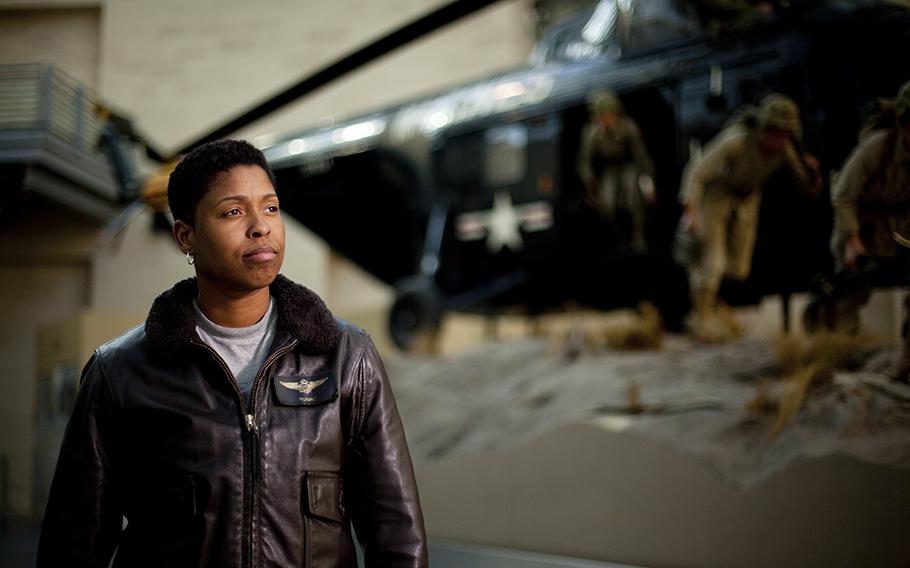
Then-Capt. Vernice Armour stands in front of an exhibit at the National Museum of the Marine Corps in February 2012. ( Chelsea Flowers/U.S. Marine Corps)
FREDERICK, Md. (Tribune News Service) — Two decades ago, Vernice Armour became the first Black woman to serve as a combat pilot in the U.S. military. She served two tours in Iraq, piloting an attack helicopter above the desert to protect her fellow Marines on the ground.
But now, Armour goes by FlyGirl, and she's taken off on a far different adventure: traveling the country as a speaker and consultant. On April 20, she'll be at the Weinberg Center for the Arts to cap off the Frederick Speaker Series' 10th-anniversary season.
Armour's speaking tour keeps her on a tight schedule. She spoke to 72 Hours last month from an airport terminal, sharing her philosophy on goal-setting and what she loves about her new career.
How long have you been traveling the U.S. as a motivational speaker?
I don't consider myself a motivational speaker — more inspirational leadership, if you will. I know it sounds like a small thing — and I'm jumping into it already — but motivation is the outside, and inspiration comes from the inside out. It's kind of the difference between coffee and a shower. Inspiration is that internal fire. I have been speaking now for about 16 years.
Can you tell me about where the name "FlyGirl" came from? Did you come up with it, or did someone come up with it for you?
I was at an event for young girls in STEM in Chicago. It was an Army Air Guard base, and I went into the flight equipment room, just to say hi. And there were these patches on the equipment table that had "FlyGirl" on them. And I said, "What?! Can I have one?" And they said, "Absolutely."
People started calling me FlyGirl when they saw it on my patch. It was cool. And at a certain point, when I did the branding for my company, I made FlyGirl a part of it because people were already calling me that. So it worked.
My call sign in the military was not FlyGirl. It was "Junk," for "junk in the trunk" [laughs]. Different time.
How long did you spend in the military?
I spent five years in the Army Reserves and 14 years on active duty. Fourteen years of total service.
And now, with these speaking engagements, does your message change from place to place depending on what you're thinking and feeling? Or do you deliver the same message in each city? Give me a sense of what you hope people take away from hearing about you and your experience.
I tailor it for each organization's unique challenges and opportunities and for what's happening. So today, for instance, I spoke to a financial institution that's been around for over 200 years. I talked about the uncertainty of these economic times, the developments in the banking industry in the last two weeks, and I took what they're going through, and what other financial institutions across the financial industry are going through, and wrapped it around my leadership principles.
The talk that I give to a financial institution isn't going to be the same talk that I'm going to give to the Truckers of America or the National Accounting Association.
What do you enjoy most about speaking to so many very different audiences?
What I enjoy most is when someone comes up to me afterwards and says, "You don't know this, but I had been considering suicide, and now I know that I can create a difference in my life." And they don't do it. Or someone who was going to quit their job, and they tell me, "You know, I'd given up, but you gave me insight on how I can create a breakthrough in my life."
I love really helping people not just to see that there's another way but actually inspiring them to go for that other way, to not be afraid to go for their goal, their vision, their dream. I've had people send me a picture of them graduating with their cap and gown three years after one of my talks, because they had been inspired to go back to school.
When you were starting out, did anyone do something similar for you? Change your outlook or inspire you?
I'm not sure if I'd say anyone changed my outlook. Of course, there was the Black woman I saw when I was a young girl {span}— s{/span}he was in an Army flight suit, and I was like, "Oh, wow, I never thought of that." I never forgot about seeing her. But when I was a kid, the philosophy of my family had a profound impact. My dad always talked about how thoughts become things and things become outcomes.
On your website, you talk about your identities as a Black woman, a gay woman and a single mom. How do those identities inform what you bring to audiences?
I can easily see how I am the epitome of intersectionality. I can connect with Black audience members, LGBT audience members, mothers, women, veterans. I happen to be a part of quite a few different communities, so I'm able to lend a perspective that will resonate with people in that community, just by virtue of who I am.
The No. 1 thing I want people to do is be unafraid of making gutsy moves. That means they know it's right in their gut, but it takes guts to do it. You've got to take action. That's the whole thing. It's not about gutsy thoughts. It's about gutsy moves.
This interview has been edited for length and clarity.
(c)2023 The Frederick News-Post (Frederick, Md.)
Visit The Frederick News-Post
Distributed by Tribune Content Agency, LLC.